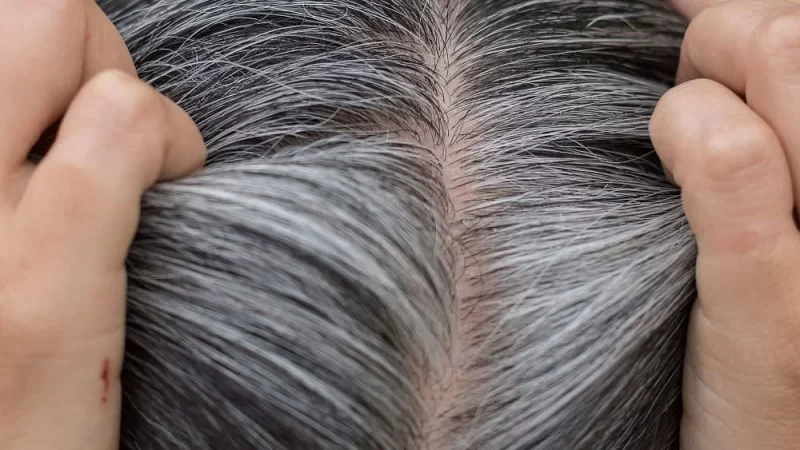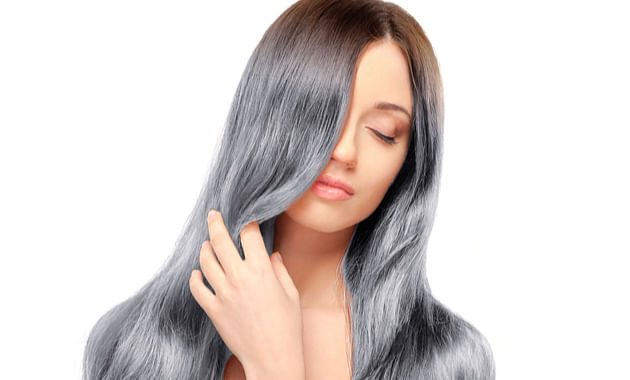
Understanding Wellhealthorganic.com know the causes of white hair and easy ways to prevent it naturally
Wellhealthorganic.com know the causes of white hair and easy ways to prevent it naturally: Ever pondered the intriguing mystery of why some individuals boast a crown of white hair while others retain their natural hues well into their advanced years? The answer lies within the intricate dance between genetics and environmental influences. This article will meticulously unravel the scientific underpinnings of white hair, shedding light on the diverse factors contributing to this unique phenomenon. From comprehending the role of melanin to exploring lifestyle choices that might hasten the process, embark on an illuminating journey through the realms of aging and genetics.
Exploring the Causes of White Hair and Natural Preventive Measures
The causes behind the emergence of white hair largely remain shrouded in uncertainty. Nevertheless, various theories attempt to elucidate this condition. One hypothesis posits that a deficiency in the pigment-producing cells (melanocytes) of the skin triggers white hair, stemming from factors like sun damage, aging, or certain medical conditions. Another theory implicates an excess of hydrogen peroxide in hair follicles, influenced by genetic predispositions, environmental exposures (such as chlorine), or specific medical conditions (e.g., overactive thyroid).
Is White Hair Invariably a Sign of Aging?
While white hair is commonly perceived as a hallmark of aging, the precise scientific mechanisms governing the transition of hair to white remain incompletely understood. Genetic and environmental factors converge to contribute to the graying of hair, with multiple elements likely playing roles in most instances.
One hypothesis suggests a gradual loss of melanocytes with age, leading to hydrogen peroxide accumulation in follicles and subsequent internal bleaching of hair. Oxidative stress and inflammation might further exacerbate this process. Alternatively, a reduction in melanin production, the pigment responsible for hair color, is posited as another cause of gray hair as the body produces less melanin with advancing age.
Also Read : Wellhealthorganic.com know why not to reuse plastic water bottles know its reason in Hindi
Various environmental factors, including smoking, exposure to UV radiation, and specific medical conditions, can contribute to premature graying. However, it is noteworthy that many individuals experience graying without discernible environmental or medical triggers. The exact cause remains elusive, likely originating from a combination of genetic and environmental influences. Individuals concerned about premature graying are encouraged to consult with healthcare professionals for potential treatment options.
The Impact of Diet on Hair Color
The relationship between diet and hair color is a common query. The answer is nuanced, with diet influencing hair color both indirectly, through effects on hair follicle health, and directly, by altering pigment cells in follicles. Protein, a crucial element for hair health, is essential for healthy hair growth, found in foods like fish, chicken, eggs, and beans.
In addition to protein, vitamins and minerals play pivotal roles in maintaining healthy hair. Vitamin A supports sebum production, vital for scalp health, while B vitamins contribute to cell turnover and pigment cell creation. Iron facilitates oxygen transport to cells, and zinc aids in tissue regeneration. Leafy greens, nuts, and seafood are rich sources of these nutrients.
Certain foods can indirectly affect hair color; for instance, excessive sugar consumption may lead to inflammation and oxidative stress, potentially causing hair follicle damage. Conversely, antioxidants like vitamin C can protect follicles from damage.
The Enigma of Stress-Induced Gray Hair
The relationship between stress and gray hair remains a topic of debate, with some evidence suggesting a potential connection. A study found higher stress levels associated with an increased likelihood of gray hair development, though causation wasn’t definitively established. Genetics and lifestyle choices might also play roles in both stress levels and gray hair development.
Benefits and Drawbacks of White Hair
White hair brings both advantages and disadvantages. On the positive side, it can impart a more youthful and attractive appearance, often associated with wisdom and intelligence. However, challenges such as difficulty finding matching hair products and societal perceptions of aging may accompany the transition to white hair.
Preventing White Hair Due to Pattern Baldness
Pattern baldness, or androgenetic alopecia, affects both men and women. Minoxidil (Rogaine) applied to the scalp stimulates new hair growth and helps prevent further loss. Finasteride (Propecia), taken orally, blocks the production of DHT, a hormone linked to pattern baldness. These interventions, along with lifestyle modifications, can manage symptoms and optimize hair appearance.
Also Read : Wellhealthorganic.com simple ways to improve digestive system in Hindi
In Conclusion
In conclusion Wellhealthorganic.com know the causes of white hair and easy ways to prevent it naturally, the science behind white hair is a captivating exploration. We’ve delved into the interplay of genetic and environmental factors influencing premature graying or the early onset of white hair. Age-related changes, health conditions, lifestyle choices, dietary habits, and genetic predispositions all play roles. Adopting proactive measures, such as making positive dietary adjustments and leading a healthy lifestyle, can mitigate signs of aging like premature graying or white hair strands, fostering overall well-being.
FAQs About Wellhealthorganic.com know the causes of white hair and easy ways to prevent it naturally
Q 1: What causes white hair?
Answer: The exact causes of white hair are not fully understood, but theories suggest it may result from a deficiency in melanocytes, exposure to environmental factors like sun damage or chlorine, and genetic predispositions. Another theory implicates an excess of hydrogen peroxide in hair follicles.
Q 2: Is white hair a natural sign of aging?
Answer: While white hair is commonly associated with aging, the science behind it is complex. Age-related factors, such as the gradual loss of melanocytes and reduced melanin production, contribute to the graying of hair. However, genetic and environmental influences also play significant roles.
Q 3: Can diet influence hair color?
Answer: Yes, diet can indirectly and directly affect hair color. A diet rich in protein, vitamins (especially A and B vitamins), minerals (such as iron and zinc), and antioxidants supports overall hair health. Conversely, excessive sugar intake may lead to inflammation and oxidative stress, potentially impacting hair follicles.
Q 4: Does stress cause gray hair?
Answer: While the relationship between stress and gray hair is not fully confirmed, some evidence suggests a correlation. Higher stress levels have been associated with an increased likelihood of gray hair development. However, other factors, including genetics and lifestyle choices, may also contribute.
Q 5: Are there benefits to having white hair?
Answer: Yes, there are benefits to having white hair. It can impart a more youthful and attractive appearance and is often associated with wisdom and intelligence. However, challenges include difficulty finding matching hair products, and societal perceptions of aging may accompany the transition to white hair.

